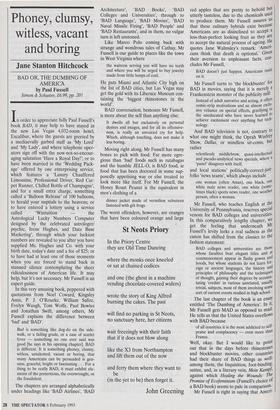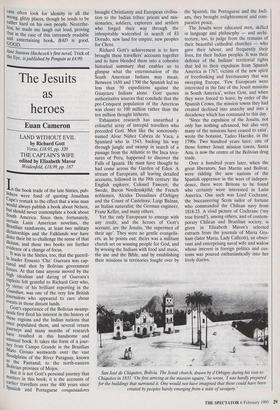Phoney, clumsy, witless, vacant and boring
Jane Stanton Hitchcock
BAD OR, THE DUMBING OF AMERICA by Paul Fussell Simon & Schuster, £6.99, pp. 201 In order to appreciate fully Paul Fussell's book BAD, it may help to have stayed in the new Las Vegas 4,032-room hotel, Excalibur, where the guests are greeted by a mediaevally garbed staff as 'My Lord' and 'My Lady', and where telephone oper- ators sign off with the now-not-so-encour- aging salutation 'Have a Royal Day!'; or to have been married in the 'Wedding Pack- age' offered by one enterprising service, which features a 'Luxury Chauffered Limousine, Professional Driver, Red Car- pet Runner, Chilled Bottle of Champagne', and for a small extra charge, something called a 'Balloon Release' of 100 balloons, to herald your nuptials to the heavens; or to have entered a lottery using a service called 'A/intuition — the Astrological Lucky Numbers Computer designed by the celebrated astrologer/ psychic, Irene Hughes, and Data Base Marketing', through which your luckiest numbers are revealed to you after you have supplied Ms. Hughes and Co. with your birth date, today's date and a fee of $25; or to have had at least one of those moments when you are forced to stand back in stunned silence contemplating the sheer ridiculousness of American life. It may help, but it's not necessary. Mr Fussell is an expert guide.
In this very amusing book, peppered with quotations from Noel Coward, Kingsley Amis, P. J. O'Rourke, William Safire, Evelyn Waugh, Tom Wolfe, Paul Bowles and Jonathan Swift, among others, Mr Fussell explains the difference between `bad' and 'BAD'.
Bad is something like dog-do on the side- walk, or a failing grade, or a case of scarlet fever — something no one ever said was good [he says in his opening chapter]. BAD is different. It is something phoney, clumsy, witless, untalented, vacant or boring, that many Americans can be persuaded is gen- uine, graceful, bright or fascinating .. . For a thing to be really BAD, it must exhibit ele- ments of the pretentious, the overwrought, or the fraudulent.
The chapters are arranged alphabetically under headings like 'BAD Airlines', 'BAD Architecture', 'BAD Books', 'BAD Colleges and Universities', through to `BAD Language', 'BAD Movies', 'BAD Naval Missile Firing', 'BAD People' and `BAD Restaurants', and in them, no vulgar turn is left unstoned.
Like Marco Polo coming back with strange and wondrous tales of Cathay, Mr Fussell is our guide to places like the town in West Virginia where
the waitress serving you will have no teeth and where you will be urged to buy jewelry made from little lumps of coal.
He puts Miami and Atlantic City high on the list of BAD cities, but Las Vegas may get the gold with its Liberace Museum con- taining the 'biggest rhinestones in the world'.
BAD conversation, bemoans Mr Fussell, is more about the self than anything else:
It dwells all but exclusively on personal desires and images, and for all its offensive- ness, is really an unvoiced cry for help. Which, although touching, does not make it less boring.
Moving right along, Mr Fussell has many bones to pick with food. Far more egre- gious than 'bad' foods such as rutabagas and the humble JELL-O, is BAD food, ie food that has been doctored in some sup- posedly appetising way or else treated to look more like itself. For Mr Fussell, the Honey Roast Peanut is the equivalent in men's clothing of a
dinner jacket made of vermilion velveteen fastened with gilt frogs.
The worst offenders, however, are oranges that have been coloured orange and large
St Neots Priory
In the Priory Centre they are Old Time Dancing where the monks once kneeled or sat at chained codices and one (the ghost in a machine vending chocolate-covered wafers) wrote the story of King Alfred burning the cakes. The past will find no parking in St Neots, no sanctuary here, her citizens wait freezingly with their faith that if it does not blow along like the X3 from Northampton and lift them out of the now and ferry them where they want to be (in the yet to be) then forget it.
John Greening
red apples that are pretty to behold but utterly tasteless, due to the chemicals used to produce them. Mr Fussell assures us that these culinary hybrids exist because Americans are as disinclined to accept a less-than-perfect looking fruit as they are to accept the natural process of ageing. He quotes Jane Walmsley's remark: 'Ameri- cans think that death is optional.' Given their aversion to unpleasant facts, con- eludes Mr Fussell,
BAD doesn't just happen. Americans insist on it.
Mr Fussell turns to 'the blockbuster' for BAD in movies, saying that it is merely a Frankenstein monster of the publicity mill: Instead of adult narrative and acting, it offers comic-strip motivations and an almost exclu- sive reliance on special effects, gratifying to the uneducated who have never learned to achieve excitement over anything but tech- nology.
And BAD television is not, contrary to what one might think, the Oprah Winfrey Show, Dallas, or mindless sit-corns, but rather relentlessly middlebrow, quasi-intellectual and pseudo-analytical news specials, where a `panel' disagrees with itself, and local stations' politically-correct-just- folks 'news teams', which always include
one woman (often Asian), one black, one white male news reader, one white (some" times black) sports news reader, one weather person, often a woman.
Mr Fussell, who teaches English at the University of Pennsylvania, reserves special venom for BAD colleges and universities. In this comparatively lengthy chapter, we get the feeling that underneath Mr Fussell's levity lurks a real sadness as the canon has shifted from the classics to the fashion statement: BAD colleges and universities are those whose faculties bear elegant titles and at commencement appear in flashy gowns and hoods, but whose students do not learn for- eign or ancient languages, the history and principles of philosophy and the technique of thought, gaining their degrees by accumu- lating 'credits' in various unrelated, usually trivial, subjects, most of them involving some sort of current events studied in high school- The last chapter of the book is an essay entitled 'The Dumbing of America'. In it, Mr Fussell gets MAD as opposed to mad. He tells us that the United States overflows with BAD because
of all countries it is the most addicted to self- praise and complacency — even more than France.
Well, okay. But I would like to point out that in the days before rhinestones and blockbuster movies, other countries had their share of BAD things as well: among them, the Inquisition, foot-binding, suttee, and, in a literary vein, Mein KamPf, against which Healing the Wounds: The Promise of Ecofeminism (Fussell's choice of a BAD book) seems to pale in comparison. Mr Fussell is right in saying that Amer' cans often look for identity in all the wrong, glitzy places, though he tends to be rather hard on his own people. Neverthe- less, he made me laugh out loud, proving that in the case of this extremely readable and entertaining book, BAD is good. GOOD.
lane Stanton Hitchcock's first novel, Trick of the Eye, is published by Penguin at f4.99.























































 Previous page
Previous page